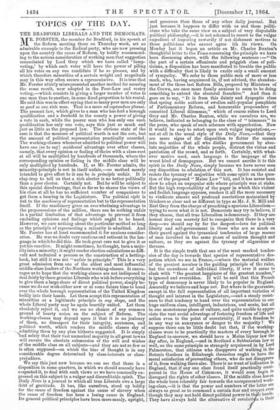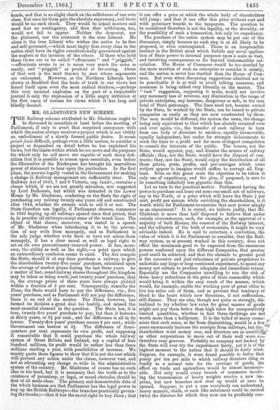TOPICS OF THE DAY.
THE BRADFORD LIBERALS AND THE DEMOCRATS.
MR. FORSTER, the member for Bradford, in his speech at the Reform meeting there on Thursday week, set an admirable example to the Radical party, who are now pressing upon the country the cause of Reform, by boldly recommend- ing to the serious consideration of working men that suggestion resuscitated by Lord Grey which we have called lump- voting,' by which each voter will have the power of piling all his votes on any one candidate if he so pleases, and by which therefore minorities of a certain weight and magnitude may in this way often secure a representative. It is true that Mr. Forster utterly misrepresented another method for securing the same result, now adopted in the Poor-Law and vestry voting,—which consists in giving a larger number of votes to one man than to another, in some fixed proportion to his rental. He said this was in effect saying that so many poor men are only as good as one rich man. That is a mere ad captandum phrase. The present law, which gives to a man who has both a borough qualification and a freehold in the county a power of giving a vote in each, while the poorer man who has only one such qualification has only one vote, says this just as much and just as little as the proposed law. The obvious state of the case is that the measure of political worth is not the vote, but the amount of political representation practically accorded. The working-classes whenever admitted to political power will have one (so to say) accidental advantage over other classes, namely, that every opinion or feeling of theirs with a class-root at all will be multiplied by hundreds of thousands, where the corresponding opinion or feeling in the middle class will be only multiplied by hundreds. If, as Mr. Forster admits, the minority-principle is not in itself unfair,—no method merely intended to give effect to it can be in principle unfair. It is clap-trap to tell us that a rich elector is no better politically than a poor elector. Certainly not. But he will be subject to this special disadvantage, that so far as he shares the views of his class at all he has no sufficient number of companions to get them a hearing in the Legislature. The political right is not.to the machinery of representation but to the representation itself. If the machinery gives an overwhelming advantage to the prepossessions of the million, there can be nothing unfair in a partial limitation of that advantage to prevent it from excluding opinions and feelings which ought to be heard. However, we care nothing about the particular method so long as the principle of representing a minority is admitted. And Mr. Forster has at least recommended it for anxious consider- ation. He was no doubt very cautious and reticent in the lan- guage in which he did this. He took great care not to give it as yet his sanction. It might sometimes, he thought, turn a majo- rity into a minority; it might render election calculations as diffi- cult and technical a process as the construction of a betting- book, but still it was not "unfair in principle." This is a very great admission from one of the ablest and most influential middle-class leaders of the Northern working-classes. It encou- rages us to hope that the working-classes are not indisposed to deal fa irly by those genuine Liberals who wish before everything to give them a large share of direct political power, simply be- cause we do not wish either now or at some future time to hand over the whole borough representation of the United Kingdom bodily into their hands. Let them accept this representation of minorities as a legitimate principle in any shape, and the whole Liberal party may be again heartily united. Let them absolutely reject it, and we see no chance of any common ground of hearty union on the subject of Reform. The working-classes may depend upon it that it is no jealousy of them, no disrespect for their integrity, acuteness, and political worth, which renders the middle classes shy of -.,admitting them by any plan hitherto suggested. It is simply Ind solely that their vast numerical majority in all great towns will ensure the absolute submersion of the will and wishes of the middle class on all subjects—and they are not so few as is often supposed—on which the bias of thought is in any considerable degree determined by class-interests or class- prejudices.
We say this just now because we can see that there is a disposition in some quarters, in which we should scarcely have suspected it, to deal with such views as we have constantly ex- pressed on this subject in a vulgar and discreditable spirit. The Daily News is a journal to which all true Liberals owe a large debt of gratitude. It has, like ourselves, stood up boldly for the cause of freedom against the cause of slavery when the cause of freedom has been a losing cause in England. Its general political principles have been more manly, upright, and generous than those of any other daily journal. Bat just because it happens to differ with us and those politi- cians who take the same view on a subject of very disputable political philosophy,—it is not ashamed to resort to the vulgar expedient of imputing cowardly if not dishonest motives to those politicians who cannot agree ith its views. On Monday last it began an article on Mr. Charles Buxton's thoughtful letter to the Times concerning the principle we have been discussing above, with the following sentence :—" On the part of a certain effeminate and priggish class of poli- ticians, a disposition has been manifested to trouble the public with a difficulty that is likely to excite only a small amount of sympathy. We refer to those public men of more or less mark, who, having acquiesced in, if not advised, the abandon- ment of the three last Reform Bills, proposed by Ministers of the Crown are once more fussily anxious to seem to be doing something !to extend the electoral franchise." And then it goes on to say, "It is from this dainty and dyspeptic clam that spring noble authors of swollen anti-popular pamphlets of Parliamentary Reform, and honourable propounders of conceited Liberal dilemmas," which of course refers to Lord Grey and Mr. Charles Buxton while we ourselves are, we believe, indicated as belonging to the class of " trimmers " in the press, who speak of such schemes with approbation. Now it would be easy to retort upon such vulgar imputations,— not at all in the usual style of the Daily News,—that they are mere signs of the disposition to flatter the masses into the notion that all who dislike government by abso- lute majorities of the whole people, distrust the virtue and patriotism of the crowd, and so forth. Certainly, with what- ever motive used, such language is the language of the worst kind of demagogues. But we cannot ascribe it to this spirit in the Daily News, simply because we have never seen any disposition to adulation of this sort. It has resisted and resists the tyranny of majorities with some spirit on the ques- tion of the proposed "Maine Law" bill, and it has never been slow to adopt an unpopular side where principle was at stake. But the high respectability of the paper in which this violent and foolish language appears, renders it all the more necessary to vindicate sincere and profound convictions maintained by thinkers as clear and as different in type as Mr. J. S. Mill and Earl Grey from the charge of preaching a spurious Liberalism— trying to seem what it is not. Democrats may try to believe, if they choose, that all true Liberalism is democracy. If they are honest they can scarcely fail to recognize that there is a very deep—we should say. by far the deepest—love for political liberty and self-government in those who are as much on their guard against the tyrannical tendencies of large masses of men involved in the same phase of uniform thought and culture, as they are against the tyranny of oligarchies or thrones.
It is the simple truth that one of the most marked tenden- cies of the day is towards that species of representative des- potism which we see in France,—where the material welfare of the greatest number is the guiding principle of the ruler, but the sacredness of individual liberty, if ever it seems to clash with "the greatest happiness of the greatest number," is ignored and overridden. It will be said that this French type of democracy is never likely to be popular in England. Assuredly we believe and hope not. But where is the guarantee, except in the fall representation of all important varieties of thought and interest in the Legislature,—and a steady resist- ance to that tendency to hand over the representation to one huge uniform class, intelligent, industrious, and acute, but all in one monotonous phase of culture, and quite unable to appre- ciate the vast social advantage of fostering freedom of' life and action even to the point of eccentricity, if such freedom be in any way an annoyance or danger to the majority ? We suppose there can be little doubt but that, if the working- classes were to be practically the masters of every borough in England to-morrow, we should have a Maine liquor law the day after, in England,—and in Scotland a Sabbatarian law as well, on the same principle so strangely acquiesced in by Lord Palmerston, that citizens who disapprove of walking in the Botanic Gardens in Edinburgh themselves ought to have the moral satisfaction of preventing others, who do not disappreV8 of it, from walking there also. There is no want of indication in England, that if any one class found itself practically omni- potent in the House of Commons, it would soon begin to disregard the rights of other classes. If the middle class has on the whole been tolerably fair towards the unrepresented work- ing-class,—it is that the power and numbers of the latter are always so great as to command a certain fear and resp ct even though they may not hold direct political power in th r hands. ; They have always held the alternative of revoluti u in their hands' and that is no slight check on the selfishness of our own class. But once let them gain the absolute supremacy, and there would be no such check. They would be actual masters and need fear no contingency, and then their selfishness, too, would not fail to appear. Neither the democrat, nor the plutocrat, nor the aristocrat is the true Liberal. He alone is the true Liberal who wishes the nation to be free and self-governed,—which must imply that every class in the nation shall have its rights constitutionally guaranteed against the neglect or the invasion of the others. If those who hold these views are to be called " effeminate " and "priggish," —effeminate seems to us to mean very much the same as manly, and "priggish" as prudent or far-seeing. Abuse of that sort is the mud thrown by men whose arguments are exhausted. However, as the Northern Liberals have shown at Bradford that the basis of truth in our views has forced itself upon even the most radical thinkers,—perhaps this very unusual explosion on the part of a respectable journal is only the expression of a little angry irritation at the first omen of success for views which it has long and blindly decried.































 Previous page
Previous page